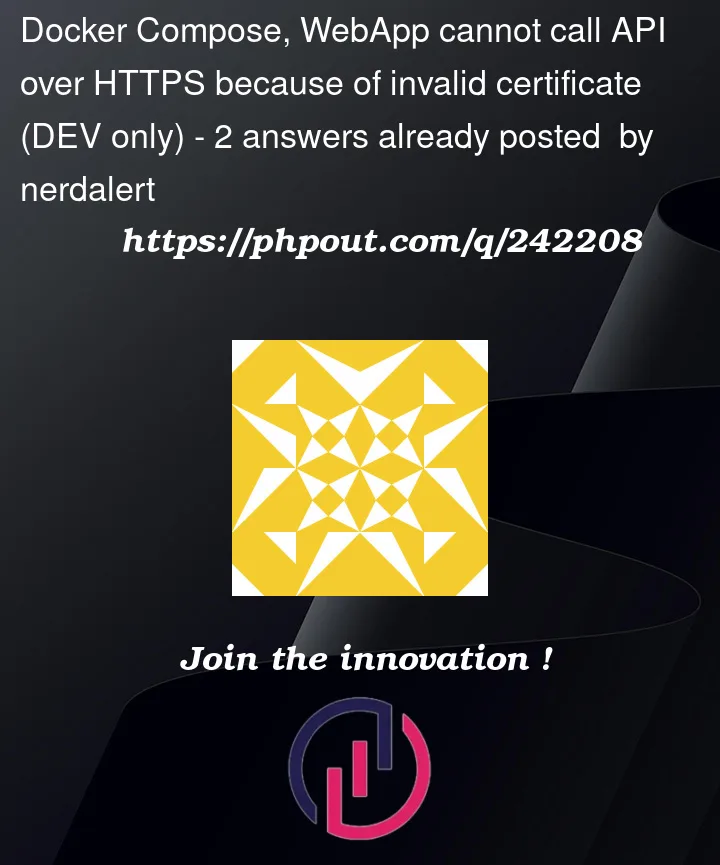I’ve searched for hours trying to solve this issue and I just cannot seem to make it work. I believe I understand what is going wrong but I don’t know how to solve it.
My app contains an API container, Front end container, and a database container that both rely on. I have the following docker compose file:
version: '3.4'
services:
invoicing.api:
image: ${DOCKER_REGISTRY-}invoicingapi
build:
context: .
dockerfile: invoicing.api/Dockerfile
ports:
- 5000:80
- 5001:443
links:
- db
depends_on:
db:
condition: service_healthy
required: true
environment:
- ASPNETCORE_ENVIRONMENT=Development
- ASPNETCORE_URLS=https://+:443;http://+:80
- ASPNETCORE_Kestrel__Certificates__Default__Password=somepass
- ASPNETCORE_Kestrel__Certificates__Default__Path=/https/aspnetapp.pfx
volumes:
- ~/.aspnet/https:/https:ro
networks:
- mybackend-network
invoicing.webapp:
image: ${DOCKER_REGISTRY-}invoicingwebapp
build:
context: .
dockerfile: invoicing.webapp/Dockerfile
ports:
- 5002:80
- 5003:443
depends_on:
db:
condition: service_healthy
required: true
networks:
- mybackend-network
db:
image: postgres:latest
restart: always
container_name: 'db'
environment:
POSTGRES_USERNAME: postgres
POSTGRES_PASSWORD: somepass
POSTGRES_DB: invoicing
ports:
- "5433:5432"
volumes:
- local_postgres_data:/var/lib/postgresql/data
networks:
- mybackend-network
healthcheck:
test: pg_isready -U postgres
interval: 10s
timeout: 5s
retries: 5
volumes:
local_postgres_data: {}
networks:
mybackend-network:
driver: bridge
My API dockerfile:
FROM mcr.microsoft.com/dotnet/aspnet:7.0 AS base
WORKDIR /app
EXPOSE 80
EXPOSE 443
FROM mcr.microsoft.com/dotnet/sdk:7.0 AS build
WORKDIR /src
COPY ["Invoicing.API/Invoicing.API.csproj", "Invoicing.API/"]
COPY ["Invoicing.Business/Invoicing.Business.csproj", "Invoicing.Business/"]
COPY ["Invoicing.Data/Invoicing.Data.csproj", "Invoicing.Data/"]
RUN dotnet restore "Invoicing.API/Invoicing.API.csproj"
COPY . .
WORKDIR "/src/Invoicing.API"
RUN dotnet build "Invoicing.API.csproj" -c Release -o /app/build
FROM build AS publish
RUN dotnet publish "Invoicing.API.csproj" -c Release -o /app/publish /p:UseAppHost=false
FROM base AS final
WORKDIR /app
COPY --from=publish /app/publish .
ENTRYPOINT ["dotnet", "Invoicing.API.dll"]
My webapp dockerfile:
FROM mcr.microsoft.com/dotnet/aspnet:7.0 AS base
WORKDIR /app
EXPOSE 80
EXPOSE 443
FROM mcr.microsoft.com/dotnet/sdk:7.0 AS build
WORKDIR /src
COPY ["Invoicing.WebApp/Invoicing.WebApp.csproj", "Invoicing.WebApp/"]
COPY ["Invoicing.Data/Invoicing.Data.csproj", "Invoicing.Data/"]
RUN dotnet restore "Invoicing.WebApp/Invoicing.WebApp.csproj"
COPY . .
WORKDIR "/src/Invoicing.WebApp"
RUN dotnet build "Invoicing.WebApp.csproj" -c Release -o /app/build
FROM build AS publish
RUN dotnet publish "Invoicing.WebApp.csproj" -c Release -o /app/publish /p:UseAppHost=false
FROM base AS final
WORKDIR /app
COPY --from=publish /app/publish .
ENTRYPOINT ["dotnet", "Invoicing.WebApp.dll"]
When I try to run an HttpClient Post (or any) call from the web app to the api app using the below code, I get the below exception.
HttpResponseMessage response = await _client.PostAsync(uri, cont);
Message:
The SSL connection could not be established, see inner exception.
InnerException:
The remote certificate is invalid according to the validation
procedure: RemoteCertificateNameMismatch, RemoteCertificateChainErrors
My uri:
https://invoicing.api:443/api/v1/Stripe/CreateCustomer
I have created a self signed certificate locally aspnetapp.pfx, trusted it, and import it to the api docker environment, without error, but when I call the API from within the webapp running from docker compose, I get this error. My belief is that within the Linux container running the API, the certificate is not trusted. It’s only trusted in my local environment.
I wouldn’t mind calling the API over HTTP to avoid the issue since this is just my dev environment, but it seems Docker is being forced to HTTPS even if I only expose the 80 port.
I’m only interested in making this work for development purposes. I’ll focus on Production when I reach that point. What should I do? Should I try trust the development certificate on the Linux container, override HTTPS and just go with HTTP if possible, or create a certificate from a certificate authority to replace my development certificate?




2
Answers
I ended up forcing the HttpClient to allow untrusted certificates while in debug mode. In release mode (production) I will have valid certificates anyway so this should not be a problem.
Bypass the cert validation in net core http client service registering.
If use Httpclient directly.
If use IHttpClientFactory
Or you could add same validation